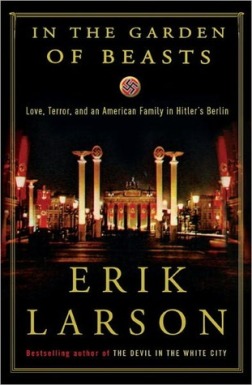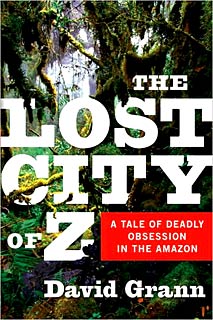This review contains affiliate links, which earn me a small commission when you click and purchase, at no extra cost to you. Thank you for supporting my small business and allowing me to continue providing you a reliable resource for clean book ratings.
It’s probably nearly impossible to count the number of books that have been written about Nazi Germany. So it would be easy to dismiss another that addresses the topic. But seasoned writer Erik Larson has managed to find a fascinating different perspective on a topic that has seen many words devoted to it: in this book, he examines the Berlin social and political scene from the viewpoint of the newly appointed United States ambassador to Germany, William Dodd.
Dodd is a Southern gentleman in his 60s who has been a professor of history for years. He has been working on his magnum opus, what he hopes to be a multivolume work called Old South, and hasn’t had the free time he’d like to get it done. He thinks that a diplomatic post of some sort would allow him the time to devote to his work that he hasn’t had as the chairman of the history department at the University of Chicago. When he gets the opportunity to be ambassador to Germany, he takes it, even though he knows that this kind of intense post will keep him too busy to write; but he realizes he would be doing high-profile work that could make an important contribution to his own reputation and to his country.
Dodd takes along his wife, his son, and his daughter, Martha, a 24-year-old with aspirations of being an author. The family isn’t wealthy, unlike most of the American diplomats, who come from the “Pretty Good Club” of old money and Ivy League educations, and Dodd is a Jeffersonian Democrat who wants to emulate fine ideals. His plan to live and operate as an ambassador on the salary he receives is laughable to his new peers, who find him to be an oddity on many levels. Martha is a flirt who has already had a full love life, including a secret marriage that is in its last throes. The fact that she hasn’t divorced yet doesn’t prevent her from leaping head-first into the active social milieu of pre-World War II Berlin.
The book focuses primarily on the experiences of Dodd and Martha, and their perspectives on the city of Berlin and the Nazis. Dodd is not pleased with how things are playing out in Germany’s politics, but he hopes to make some kind of a positive impression, and, as with so many other observers at the time, he is sure that each negative action of Hitler and his cronies will surely lead to the end of his regime. Martha is for a long time enamored of the gallant young men who are so handsome and blond and loyal to their country. But in less than a year’s time (the book focuses on the time period from mid-1933, when the Dodds first arrive in Berlin, to a year later), Dodd and Martha become disillusioned.
It’s fascinating to read about this particular set of perspectives when the world had no idea what would come in just a few short years, and to read about the activities of this family and those with whom they were in contact; it is especially astonishing to learn about Martha’s love affairs, which were many and blatant, quite shocking for a diplomat’s daughter. She is involved with a head of the Gestapo and with a Soviet spy, to name just two.
The book provides a lot of food for thought and is well written, as is to be expected from Larson. Highly recommended.
Rated: Mild, primarily for references to violence. There are just a few incidences of language, and only references to promiscuous behavior but no real details.
Click here to purchase your copy of In the Garden of Beasts on Amazon.




